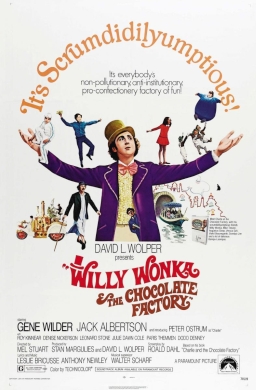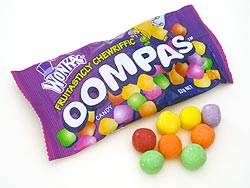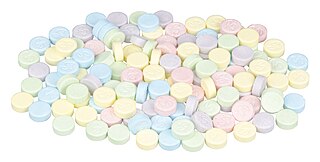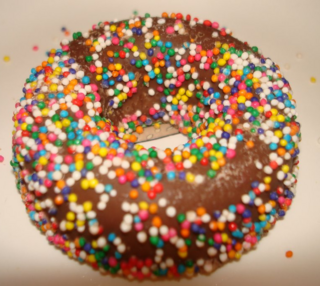Related Research Articles

Charlie and the Chocolate Factory is a 1964 children's novel by British author Roald Dahl. The story features the adventures of young Charlie Bucket inside the chocolate factory of eccentric chocolatier Willy Wonka.

Willy Wonka & the Chocolate Factory is a 1971 American musical fantasy film directed by Mel Stuart from a screenplay by Roald Dahl, based on his 1964 novel Charlie and the Chocolate Factory. It stars Gene Wilder as chocolatier Willy Wonka. The film tells the story of a poor child named Charlie Bucket who, upon finding a Golden Ticket in a chocolate bar, wins the chance to visit Willy Wonka's chocolate factory along with four other children from around the world.

Willy Wonka is a fictional character appearing in British author Roald Dahl's 1964 children's novel Charlie and the Chocolate Factory, its 1972 sequel Charlie and the Great Glass Elevator and several films based on those books. He is the eccentric founder and proprietor of the Wonka Chocolate Factory.

Nestlé Candy Shop was a confectionery brand owned and licensed by the Swiss corporation Nestlé. In 2018, the branding and production rights were sold to the Ferrero Group, and as a result, the brand was discontinued.
Tart 'n' Tinys are small, fruit-flavored candies distributed by Leaf Brands. Tart 'n' Tiny's were originally manufactured by the Wonka company in five colors, bluish-purple (grape), yellow (lemon), orange (orange), red (cherry), and green (lime). In 2015 when they were reintroduced, they added a new color, light blue.

Oompas, now discontinued, were candy produced under the Willy Wonka brand name. They were labeled as ‘Peanut Butter Oompas’.

SweeTarts are sweet and sour candies invented under the direction of Menlo F. Smith, CEO of Sunline Inc., in 1962. The candy was created using the same small basic recipe as the already popular Pixy Stix and Lik-M-Aid products.

Spree is a candy manufactured by The Willy Wonka Candy Company, a brand owned by the Ferrara Candy Company unit of Ferrero SpA. Spree was created by the Sunline Candy Company, later renamed Sunmark Corporation, of St. Louis, Mo., in the mid-1960s. Spree was an idea of an employee named John Scout. In the 1970s the brand was bought by Nestlé, which markets the candy under the Willy Wonka brand.

The Wonka Bar is a fictional chocolate bar, introduced as a key story point in the 1964 novel Charlie and the Chocolate Factory by Roald Dahl. Wonka Bars appear in each film adaptation of the novel: Willy Wonka & the Chocolate Factory (1971); Charlie and the Chocolate Factory (2005); and Wonka (2023). The bar also appeared in Charlie and the Chocolate Factory the Musical (2013).

Wonka Donutz were candies sold by Nestlé under their Willy Wonka Candy Company brand. They were donut-shaped pieces of chocolate covered in sprinkles, with a truffle-like inside. These were widely promoted ahead of the release of Charlie and the Chocolate Factory in 2005. However, they were short-lived, and discontinued, due to low sales.

The Everlasting Gobstopper is a gobstopper candy from Roald Dahl's 1964 children's novel Charlie and the Chocolate Factory. According to its creator Willy Wonka, it was intended "for children with very little pocket money". It not only changes colours and flavours when sucked on, but also never gets any smaller or disappears. In 1976, the name of the fictional candy was used for a product similar to a normal gobstopper, or jawbreaker.
Punky's was a candy sold by Nestlé in the late-1980s and early-1990s. They came in a variety of sweet and sour fruit flavors. Punky's were small, oval in shape, and had a somewhat rough texture, with some slightly larger sugar crystals embedded in the candies.
Wonka can refer to the following:
The Wonka Xploder was a chocolate bar launched by Nestlé in the United States in 2000, and in the UK in 1999. In Australia, it was released under the "KaBoom" name.

Roald Dahl's Willy Wonka, also known simply as Willy Wonka, is a musical with music and lyrics by Leslie Bricusse and Anthony Newley and a book by Bricusse and Timothy Allen McDonald. It is based on 1964 novel Charlie and the Chocolate Factory by Roald Dahl. The musical was commissioned by Music Theatre International and is licensed for performance by amateur theatre groups.

Charlie and the Chocolate Factory is a musical based on the 1964 children's novel of the same name by Roald Dahl, with book by David Greig, music by Marc Shaiman and lyrics by Shaiman and Scott Wittman.
Wonka Biscuits were a type of chocolate-coated biscuit manufactured by Nestlé under The Willy Wonka Candy Company brand in the UK. They were only available during mid-2002.
Wonka Gummies are a line of gummy sweets made by The Willy Wonka Candy Company. They were launched in 2009 and are available in 155.9g/5.5 ounce bags. The Sluggles, Puckerooms, Wingers, and Sploshberries were previously marketed as coming from Wonka's edible garden, up until November 2010.

Tom and Jerry: Willy Wonka and the Chocolate Factory is a 2017 American animated direct-to-video musical comedy film starring the cat-and-mouse duo Tom and Jerry. Produced by Warner Bros. Animation and Turner Entertainment Co., it is the first Tom and Jerry direct-to-video film to be distributed by Warner Bros. Home Entertainment internationally and is also the final Tom and Jerry direct-to-video film to be involved with Warner Bros. Animation's founder Hal Geer, who died on January 26, 2017. The film is an animated adaptation of the 1971 film Willy Wonka & the Chocolate Factory with the addition of Tom and Jerry as characters and seen through their point of view.
References
- Wonka.com